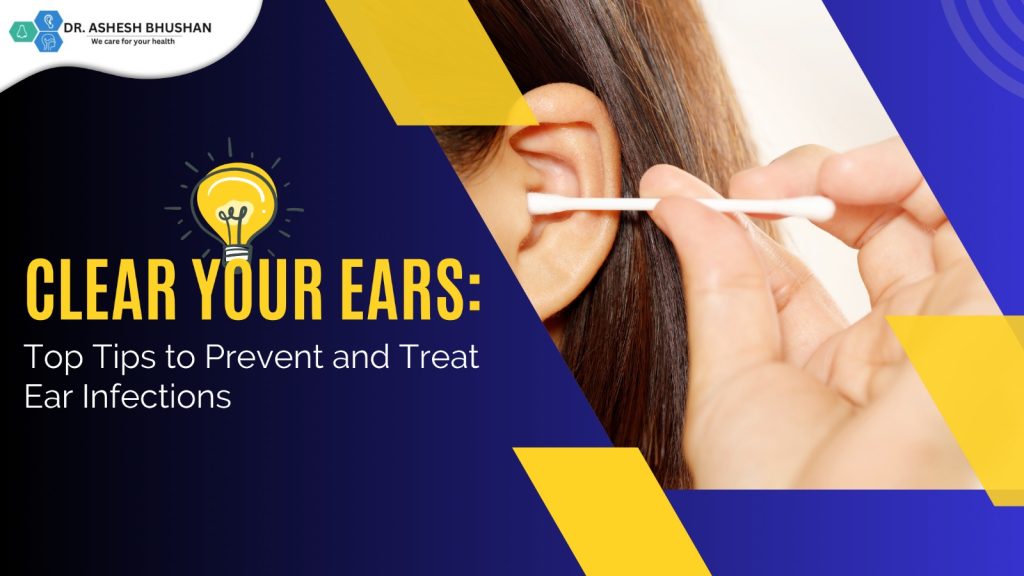
Ear infections are a common health concern that can affect people of all ages, from infants to adults. They often cause discomfort, pain, and even temporary hearing loss if left untreated. Fortunately, with proper ear hygiene and timely intervention, you can prevent most ear infections and treat them effectively. In this article, we’ll explore the causes of ear infections, practical tips for maintaining ear health, and guidance on when to seek professional help.
Understanding Ear Infections
Ear infections occur when bacteria, viruses, or fungi invade the ear, leading to inflammation and discomfort. The most common type, otitis media, affects the middle ear and is often seen in children due to their smaller, more horizontal Eustachian tubes, which can trap fluid. Otitis externa, or swimmer’s ear, affects the outer ear canal and is often caused by water exposure or irritation. Knowing the causes can help you take proactive steps to prevent infections.
Common causes of ear infections include:
Moisture in the ear canal: Trapped water from swimming or bathing creates a breeding ground for bacteria.
Upper respiratory infections: Colds or allergies can block the Eustachian tubes, leading to fluid buildup.
Earwax buildup: Excessive or impacted earwax can trap bacteria and cause irritation.
Foreign objects or trauma: Inserting objects like cotton swabs or scratching the ear canal can introduce bacteria or fungi.
Weakened immune system: A compromised immune system increases susceptibility to infections.
Top Tips for Preventing Ear Infections
Maintaining good ear hygiene and adopting preventive habits can significantly reduce your risk of developing ear infections. Here are some practical tips to keep your ears healthy:
1. Keep Your Ears Dry
Moisture is a primary culprit in ear infections, particularly swimmer’s ear. After swimming or bathing, gently dry your ears with a clean towel. Tilt your head to drain any water trapped in the ear canal. For frequent swimmers, consider using earplugs designed for water protection or a swim cap to minimize water exposure. Over-the-counter drying drops can also help remove residual moisture.
2. Practice Safe Ear Cleaning
Cleaning your ears improperly can lead to infections or impacted earwax. Avoid using cotton swabs or other objects to clean inside the ear canal, as they can push wax deeper or damage the delicate skin. Instead, clean the outer ear with a soft cloth or tissue. If you suspect excessive earwax, consult a healthcare professional for safe removal.
3. Manage Allergies and Colds
Upper respiratory infections and allergies can lead to fluid buildup in the middle ear, increasing infection risk. Stay on top of allergy symptoms with antihistamines or nasal sprays as recommended by a doctor. For colds, stay hydrated and use saline nasal rinses to keep nasal passages clear, helping the Eustachian tubes function properly.
4. Avoid Foreign Objects
Inserting objects like hairpins, pens, or earbuds into the ear canal can cause scratches or irritation, creating an entry point for bacteria. Teach children to avoid putting small objects in their ears, as this is a common cause of infections in young kids.
5. Boost Your Immune System
A strong immune system can fend off infections before they take hold. Eat a balanced diet rich in fruits, vegetables, and whole grains to support your body’s defenses. Regular exercise, adequate sleep, and staying up to date on vaccinations, such as the flu shot, can further reduce your risk of infections that may spread to the ears.
Treating Ear Infections
Despite your best efforts, ear infections can still occur. Early treatment is key to preventing complications. Here’s how to address them:
Home Remedies
For mild infections, home remedies can provide relief while the body fights off the infection:
Warm compress: Apply a warm, damp cloth to the affected ear to reduce pain and inflammation.
Over-the-counter pain relief: Medications like ibuprofen or acetaminophen can alleviate discomfort.
Ear drops: For swimmer’s ear, over-the-counter antiseptic or drying drops may help. Always follow product instructions.
When to Seek Professional Help
While some ear infections resolve on their own, certain symptoms warrant a visit to a healthcare provider:
Severe or persistent pain lasting more than 48 hours.
High fever (above 102°F or 39°C).
Discharge from the ear, especially if it’s bloody or pus-filled.
Hearing loss or dizziness.
Symptoms in infants or young children, who are more prone to complications.
A doctor may prescribe antibiotics for bacterial infections or recommend other treatments, such as earwax removal or ear tube placement for recurrent infections. Never ignore symptoms that worsen or persist, as untreated ear infections can lead to complications like hearing loss or the spread of infection.
Special Considerations for Children
Children are particularly susceptible to ear infections due to their anatomy and developing immune systems. Monitor for signs like tugging at the ears, irritability, or difficulty sleeping. If your child has frequent infections, consult a pediatrician about preventive measures, such as vaccinations or, in some cases, surgical options like ear tubes.
Final Thoughts
Ear infections are often preventable with proper care and attention to ear hygiene. By keeping your ears dry, avoiding irritants, and addressing colds or allergies promptly, you can minimize your risk. If an infection does occur, early intervention—whether through home remedies or professional care—can make all the difference. Stay vigilant about symptoms, especially in children, and don’t hesitate to seek medical advice when needed. With these tips, you can keep your ears clear and healthy for years to come.
